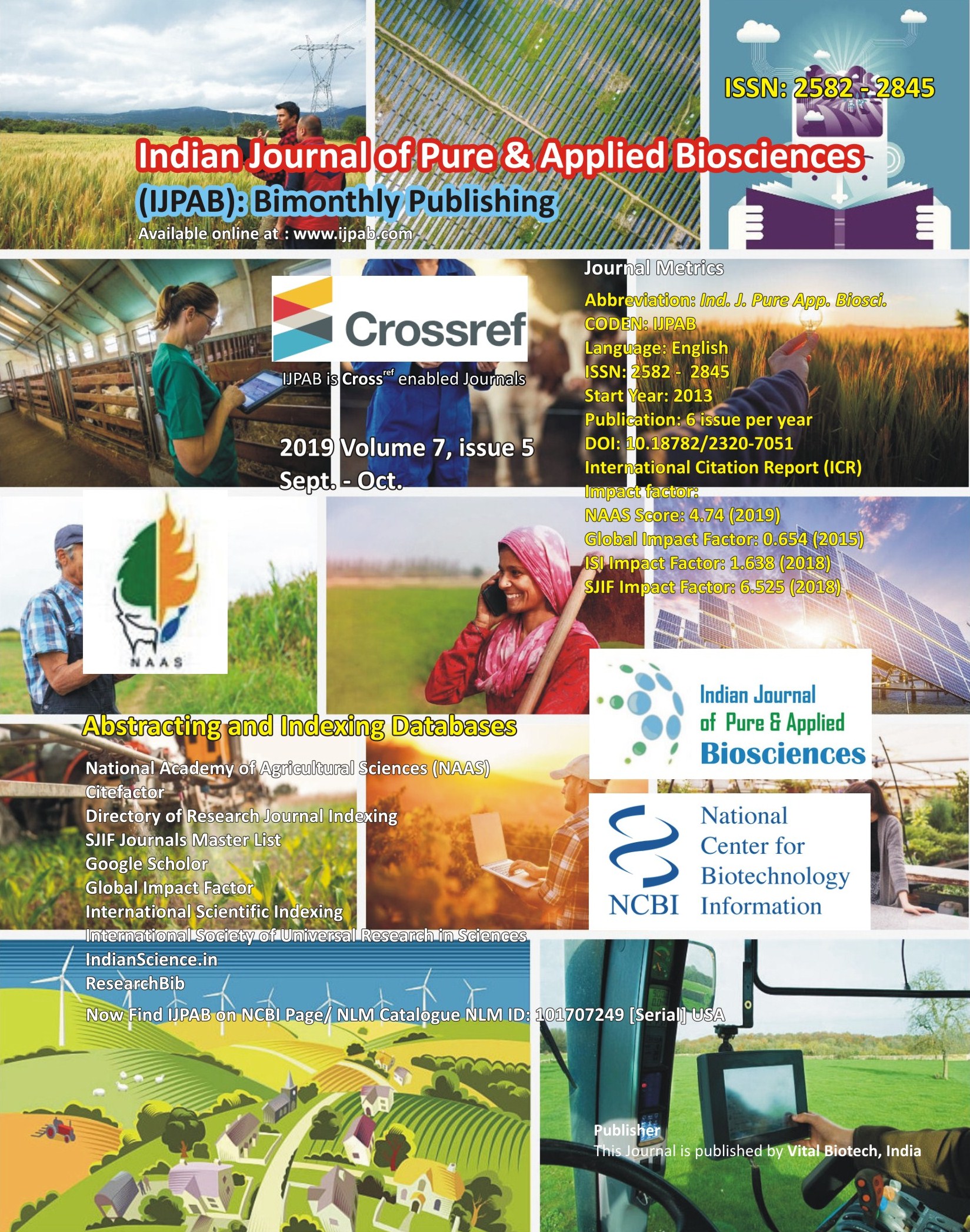
-
No. 772, Basant Vihar, Kota
Rajasthan-324009 India
-
Call Us On
+91 9784677044
-
Mail Us @
editor@ijpab.com
Indian Journal of Pure & Applied Biosciences (IJPAB)
Year : 2019, Volume : 7, Issue : 5
First page : (197) Last page : (204)
Article doi: : http://dx.doi.org/10.18782/2320-7051.7745
Effect of Organic Farming Practices on Yield of Basmati Rice and Soil Properties in Rice, Wheat Cropping System
Kundan Kumar1*, Dinesh kumar Sharma2, Amrita Kanchan3 and Archana Tiwari3
1Center for Research Studies, Noida International University, Noida, UP, India
2School of Sciences, Noida International University, Noida, UP, India
3Division of CESCRA, Indian Agricultural Research Institute, Pusa, New Delhi-110012
*Corresponding Author E-mail: Kundans.bt@gmail.com
Received: 2.07.2019 | Revised: 9.08.2019 | Accepted: 15.08.2019
ABSTRACT
This paper analyzes the management of soil organic matter is critical to maintain a productive organic farming system. No one source of nutrient usually suffices to maintain productivity and quality control in organic system. In addition, the inputs to supplement nutrient availability are often not uniform presenting additional challenges in meeting the nutrient requirement of crops in organic systems. With this concept, a field experiment was conducted at village Jahangirpur in Jewar Tehsil in Gautam Buddha Nagar district of Uttar Pradesh during 2014-2016 in rice-wheat cropping system. In this experiment, different treatments comprising organic amendments such as Blue Green Algae (BGA) 15kg/ha, SGM 10.0 tonne/ha, and Farm Yard Manure (FYM) 10.0 tonne/ha each applied alone or in combination were tested in organic crop production. These treatments were compared with absolute control (N0P0K0). For rice, a scented variety ‘Pusa Basmati 1’ were taken. The observations on grain yield, contents of Fe, Zn, Mn and Cu in rice grains, insect pest incidence, soil nutrients and microbial activity were taken. Results revealed a significant enhancement in grain yield of rice over absolute control due to the application of different organic amendments applied alone or in combinations. Rice grain yield increased by 114 to 116.8% over absolute control when all the 4 organic amendments were applied altogether. The rice grain yield (4.0 t ha-1) obtained under combined application of four organic amendments was at par with the yield recorded under recommended dose of chemical fertilizer application. An interesting observation recorded was that there was no serious attack of any insect pest or disease in organically grown crop. Soil microbial population (Actinomycetes, Bacteria, Fungi and BGA) enhanced due to the application of organic amendments in comparison to absolute control application that in turn resulted in a notable enhancement in soil dehydrogenase and phosphatase enzyme activity. Soil organic carbon and available phosphorus contents were also found to be significantly increased due to organic farming practice over control. Rice grain analysis for nutrients viz. Fe, Zn, Mn and Cu showed a significant increase in Fe and Mn content in the treatments having 2 or more organic amendments over control. Zn and Cu content also increased but the increment was significant with combined application of 2 or 3 organic amendments. The study revealed that addition of three organic amendments viz. BGA, SGM, and FYM could give the optimum yield (4.05 t/ha) of organic Basmati rice and improve grain and soil quality.
Keywords: Organic farming, Bio fertilizer, Organic amendments, Grain quality, Basmati rice, Soil microbial activity
Full Text : PDF; Journal doi : http://dx.doi.org/10.18782
Cite this article: Kumar, K., Sharma, D.K., Kanchan, A. & Tiwari, A. (2019). Effect of Organic Farming practices on Yield of Basmati Rice and Soil Properties in Rice, Wheat Cropping System, Ind. J. Pure App. Biosci.7(5), 197-204. doi: http://dx.doi.org/10.18782/2320-7051.7745

